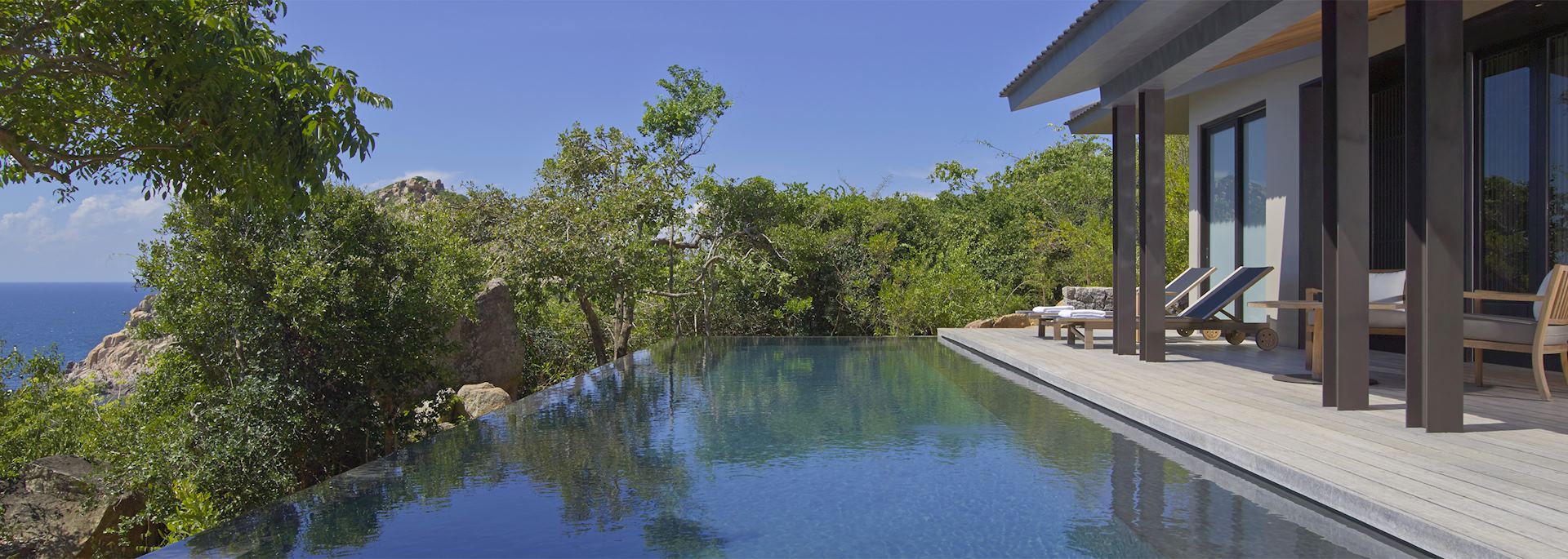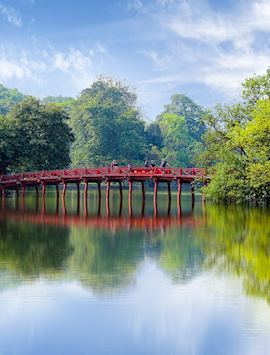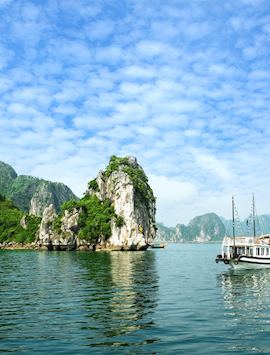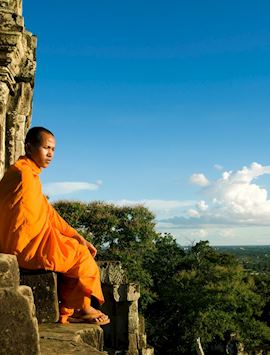By Vietnam specialist Mark
Since the late 1960s, luxury travel in Vietnam has oozed a different kind of opulence to other parts of the world.
The country's history and landscape, shaped in part by the Vietnam War, are its defining factors, so while there are hotels that epitomise the beach paradise idyll, there are also those where the most sought-after accommodation, enjoyed by the likes of Jane Fonda, is in former bomb bunkers.
Above all, the service provided at luxury hotels in Vietnam goes way beyond the expectations of a five-star hotel, taking the concept to new heights.
Luxury travel in Hanoi

In the north of Vietnam, you have to start in the capital of Hanoi. Divided into a French quarter and a Vietnamese quarter because of its colonial history, the two areas have distinctly different atmospheres.
The Vietnamese quarter is clamorous with daily life, while in the French part of the city it's about wine and boulevards, and the capital's top hotel, the Sofitel Legend Metropole.
Over its 100-year history, the hotel has kept its colonial style — in external appearance it could have been lifted straight from the boulevards of Paris. Its location close to the opera house makes it a centrepiece surrounded by French charm.
In addition to the five-star facilities including an open-air pool, spa, three restaurants and a renowned French chef, the hotel recently uncovered a number of former bomb bunkers.
This isn't necessarily the first thing you look for when planning a luxury holiday, but found alongside the bunkers were records of famous occupants from the late 1960s and early 1970s, including Jane Fonda.
Today, you can go for a tour of the bunkers, which takes about an hour and is an experience only for Sofitel guests.
Halong Bay on a junk boat
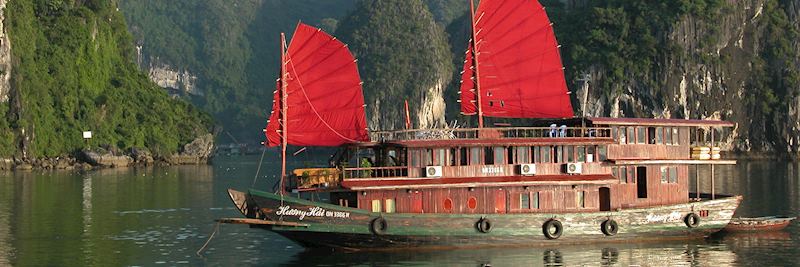
Ancient Chinese-style sailing ships are still in use across Asia, and are an opulent way to explore the bay that’s known for its emerald waters and towering limestone islands.
An overnight charter on a junk boat at Halong Bay is best experienced when the water’s clear and the weather’s dry in January or February.
The boats are designed for either two or four people, and some have Jacuzzis on board.
The service is exemplary with catering offering exceptional seafood, although that’s a personal preference — you can have almost any dish you request.
To get the most out of your charter, check in at 11am then head out on the boat and explore the islands — hopping off to hike and explore as you wish. You then dine on the boat, stay overnight, and in the morning there’s optional t'ai chi, taken by the boat's instructor, as the sun rises — a magical if early experience.
You then return to the mainland at around 10am.
To get to Halong Bay from Hanoi you can either choose to drive the four-hour journey or take a 45-minute ride in a seaplane. It’s an experience that very few people get to have, looking down and seeing thousands of limestone islands jutting out into the bay as it stretches out ahead of you.
Luxury in central Vietnam
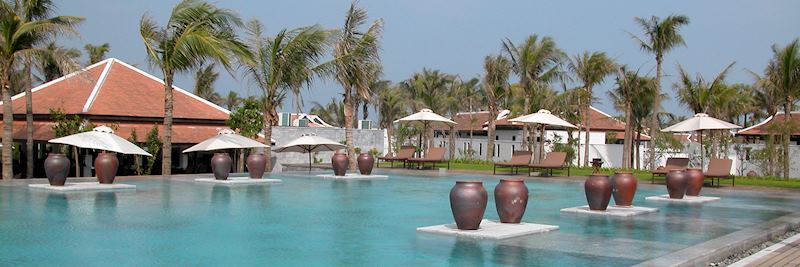
Central Vietnam claims two UNESCO World Heritage Sites, the old cities of Hue and Hoi An.
Hue is characterized by the mausoleum of the last imperial family and gives a sense of the country’s dynastic history, while Hoi An is an old fishing port that’s been lovingly restored and is still a thriving market town.
Hoi An is a popular destination for its combination of coast and culture. Visitors revel in the cookery courses, and it’s also home to some of the top tailors in Southeast Asia. Dresses and suits are made from high-quality fabrics, but at a fraction of the cost demanded back home, and completed at an unbelievable speed.
Most people choose to stay in Hoi An for two or three days when holidaying in Vietnam, but for luxury and relaxation I’d suggest you then move just along the coast to the Nam Hai hotel.
The hotel is known as one of the best beach destinations in Vietnam: a series of villas on a long stretch of sand ranging from one to five bedrooms, some with private pools.
There are spa treatments and you can choose to have in-villa dining courtesy of a private chef.
Luxury travel in Ho Chi Minh City

Moving south to Ho Chi Minh City, there’s a very different feeling. The city was all but destroyed during the Vietnam War so today it is a commercial hub that’s been rebuilt and is on a par with the likes of Bangkok.
Ho Chi Minh City's history is palpable as you explore the Cu Chi Tunnels — a network of underground passages used by the Viet Cong in the 1960s.
A walking tour will take you to the war monuments and the city’s replica of the Notre Dame Cathedral.
My recommended luxury hotel in Ho Chi Minh City is the Park Hyatt in Lam Son Square. Aside from having a location that allows you to walk straight out and into the markets and restaurants, it also holds all the classic five-star facilities, including spa treatments, and an eco-friendly stance, which means all information is on iPads in the rooms.
The food is also spectacular. I highly recommend the Eggs Benedict or Kongi — a type of rice porridge that I have learned to love.
Six-star luxury in the southeast

One of the first things I noticed about the peaceful coastal retreat the Amanoi, which is part of the Aman brand, is that you never hear anyone approaching but everything is kept immaculate.
Such is the quality of the Aman brand that many of our travellers choose to stay only in their hotels with exclusive benefits for those who stay in two or more venues.
The Amanoi is made up of a collection of bungalows scattered across the hillside and overlooking Vinh Hy Bay.
The design nods toward the area’s imperial history but is fused with contemporary style. Luxury details extend to chauffeured buggies and a cliff-top swimming pool that reminds you of the natural decadence of the location itself.
Thanks to the remote position the area is also teeming with birdlife — an unusual feature for Vietnam as a lot of natural habitats were destroyed in the war.
While staying at the Amanoi it’s worth visiting the neighbouring islands, which have a similarly untouched charm.
Luxury on the Con Dao archipelago

Finally, staying on the Con Dao archipelago is a very different experience to other areas of Vietnam. With its rustic, barren beauty it’s sometimes reminiscent of the Scottish Hebrides, but it’s also probably the best place to go scuba diving in Vietnam, with untouched coral teeming with sealife.
The archipelago is made up of around 12 islands off Vietnam’s southeast coast. It was once a French penal colony and latterly an American prison, still present in its dilapidated form.
On the island of Con Son, the Six Senses Con Dao hotel dominates its surroundings. Fifty pool villas run along the beach, all in various sizes sleeping two to eight people, but all part of the brand’s signature Robinson-Crusoe style luxury.
Aside from the hotel, the island is very much a local place with little other accommodation and restaurants, so be prepared to find luxury in a remote guise.
Start planning your luxury trip to Vietnam
-
![Hoan Kiem Lake, Hanoi]()
-
![Halong Bay, Vietnam]()
-
![Monk, Angkor Wat]()
Grand tour of Indochina: Laos, Vietnam & Cambodia
Laos, Vietnam, Cambodia and ThailandView this tour
Start thinking about your experience. These itineraries are simply suggestions for how you could enjoy some of the same experiences as our specialists. They're just for inspiration, because your trip will be created around your particular tastes.
View All Tours in Vietnam
